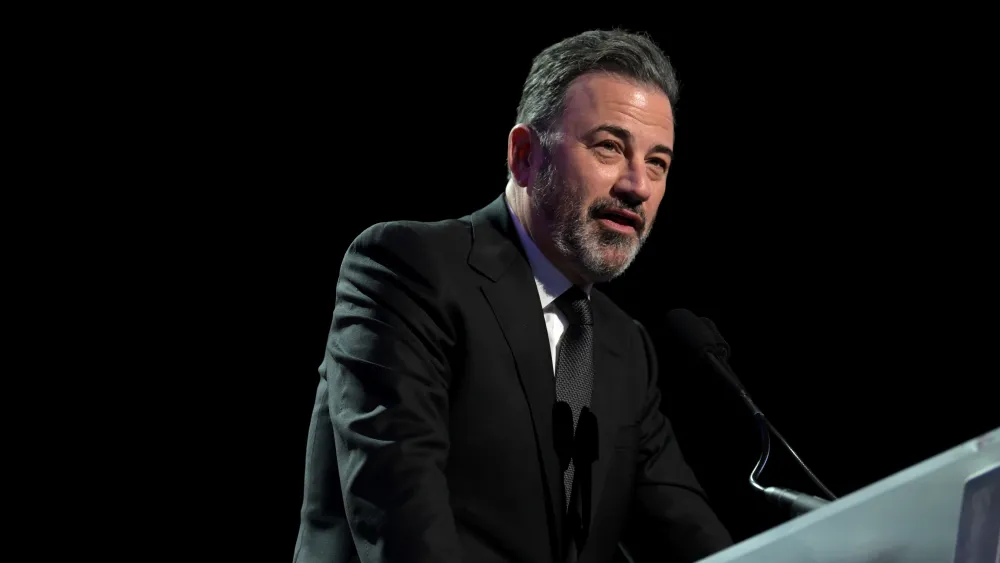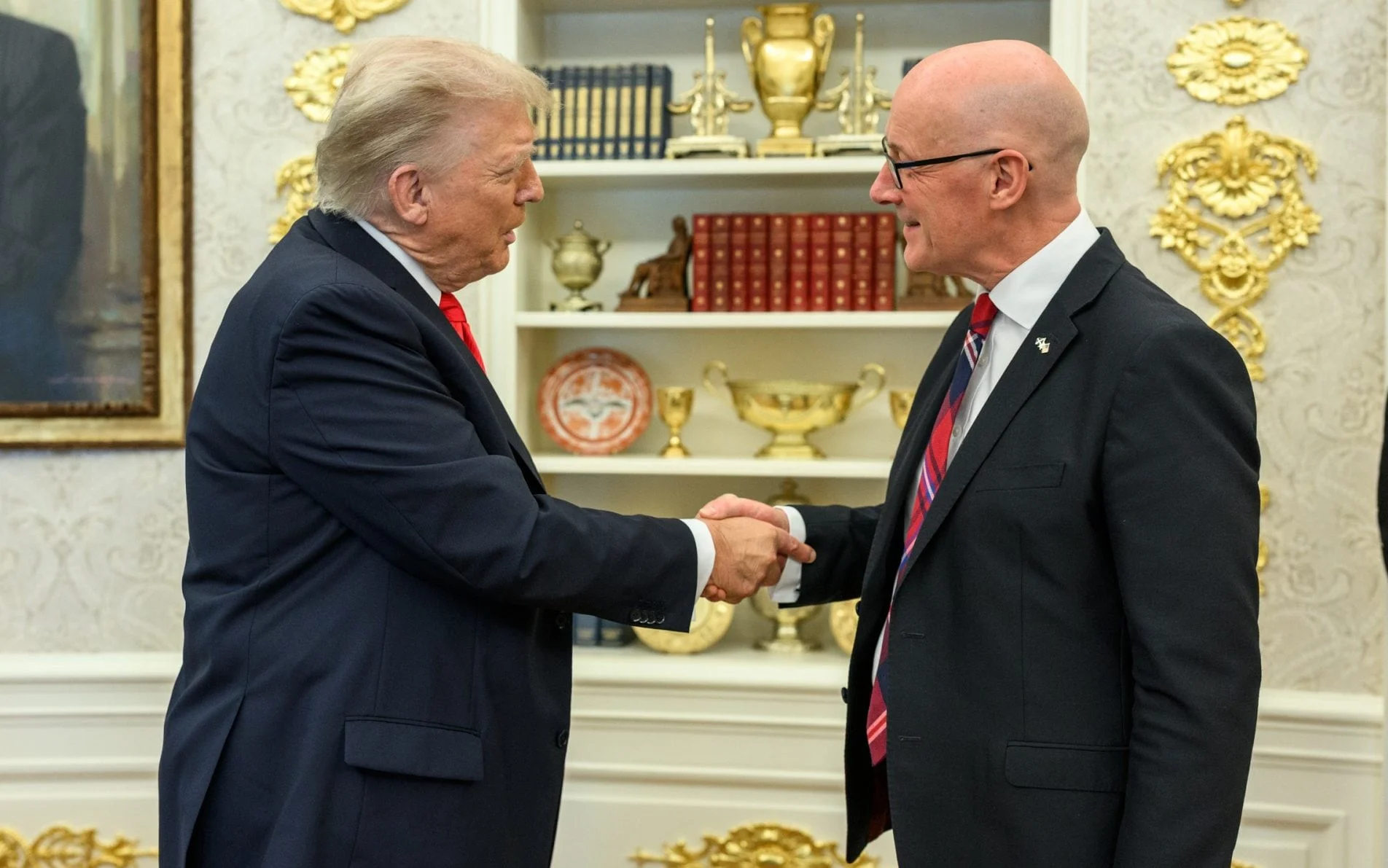
On Wednesday morning, hours before Jimmy Kimmel would go on to be pulled from ABC indefinitely after incurring the ire of the FCC, the New York Times’ arts desk tweeted their “Best of Late Night” morning roundup. The joke they highlighted? Jimmy Fallon’s quip on NBC about Donald Trump’s trip to the United Kingdom, in which Fallon said that Trump would need to return home by midnight, or else his carriage (or, confusingly, Trump himself?) might turn back into a pumpkin.
That, perhaps, is the only kind of political humor that is still safe: Gesturing toward a punchline while risking nothing, saying nothing. It’s not hard to notice that, much like the carriage-riding Trump of his joke, Fallon is a Cinderella figure these days. In Trump’s first term, his position among his peers slipped as Fallon was less willing or able to be political than Kimmel or than CBS’ Stephen Colbert. Colbert is now a lame duck, with his entire franchise ending next spring; Kimmel may or may not return to air, but, if he does, he will have had his comic wings clipped after having had the full force of the federal government’s power trained on him.
In a Monday monologue, Kimmel spoke about the assassination of conservative speaker Charlie Kirk, addressing Trump supporters’ characterization of accused killer Tyler Robinson’s politics and mocking the president’s ordering American flags to half-mast. As to the suspect’s political beliefs: The case is dynamic and still unfolding, and confidently expressing a perspective might have been imprudent.
But imprudence is not a crime. Imprudence, in fact, can be the wellspring of great comedy — at least in a society where we understand free speech to be a foundational right and a virtue. So much for that! Disney’s pulling Kimmel on Wednesday came after FCC chair Brendan Carr said that the commission could potentially revoke ABC’s affiliate licenses, preventing the network from broadcasting entirely. Affiliate groups announced they were pulling the show before the entire network followed suit.
It’s worth noting this was not just a rank-and-file Disney employee who got kicked to the curb. Kimmel is the face of the network — a repeat host of the Oscars and Emmys on ABC’s air, and who the network brings in like clockwork at their upfront presentation to roast its own programming. His “getting political,” too, drew his show widespread plaudits when, in Trump’s first term, Kimmel used his pulpit to speak about healthcare in America after his newborn son was found to have a congenital heart ailment. In other words, Kimmel was a company man, and one whose past attempts to speak out had been met with hearty applause. And even he was not safe.
Not for the first time this year, an atmosphere of threat and of power politics has encroached upon the constitutionally protected tradition of free speech in this country, and taken our country to a place we haven’t been before.
What, then, lies ahead? It feels grimly apparent that Fallon may be the last man standing in the 11:35 p.m. timeslot, placing him in the unpleasant and — even a critic of his can acknowledge — uncomfortable position of at least being perceived as the state-media version of late night. It may just be that the man who was not right for the moment in the #Resistance era of 2017 is just perfect for a time in which attempts to speak out are punished so harshly as to seem not worth the trouble.
That, in the end, is the practical effect of the Trump administration’s approach to cultural politics, or culture-as-politics — Kimmel, like Colbert, is not being thrown in jail for his thought crimes. But he’s being used to make an example that resounds among his entertainment-industry peers and to all of us watching at home: Those who are not in line will be forced to get in line, or to face consequences that make life and earning a livelihood significantly harder. I noted with interest the firing of MSNBC contributor Matthew Dowd hours after he shared infelicitously phrased thoughts on Kirk’s rhetorical approach; it called to mind a similar-enough incident, in September 2001, when Bill Maher, then a late-night host on ABC, referred to the Sept. 11 suicide attackers as “not cowardly” by comparison to the American defense apparatus. Amid huge outcry, Maher stayed on his show until it was, eventually but not swiftly, canceled a little less than a year later. The Bush administration’s press secretary Ari Fleischer decried Maher, but it was just that: Meeting his speech with more speech. The brute force of government was not employed to take revenge upon ABC.
That’s because there had been, up to a point very recent in our history, an understanding that the citizen has endless options when confronted with speech he or she does not like: Not to be trite, but changing the channel is one. So is speaking back, by contacting advertisers or writing op-eds or using the opposing argument to clarify his or her own. Now, though — as the result of an election won by less than two percentage points of the popular vote — criticism of the party in power is, effectively, so close to being illegal that it differs in all but name.
What, then, lies ahead for TV? (Beyond the scope of this column is the question of TV news in particular, especially as CBS News and, possibly, CNN may transform under the reported potential leadership of self-styled firebrand Bari Weiss, whose career mission has been to move the media toward a particular set of orthodoxies in which she believes.) It’s hard to imagine CBS and ABC’s late-night airtime being filled by programming with a right-wing perspective — although the red-state-coded host and multiple country-music performances at the recent Emmys telecast raised my eyebrow from a cultural-signaling perspective, explicitly conservative comedy has not worked, to this point, on television.
More likely it just sits idle, a pointed reminder of the not-worthwhile risk a comedian takes when offending the leader. All that will be left is Fallon joking about carriages turning into pumpkins. It’s a joke that may mean more than he could possibly know: Cinderella didn’t know how good she had it for a while there, but stuff to which you become accustomed, like the right to free speech, can vanish just like that when the clock strikes midnight.



